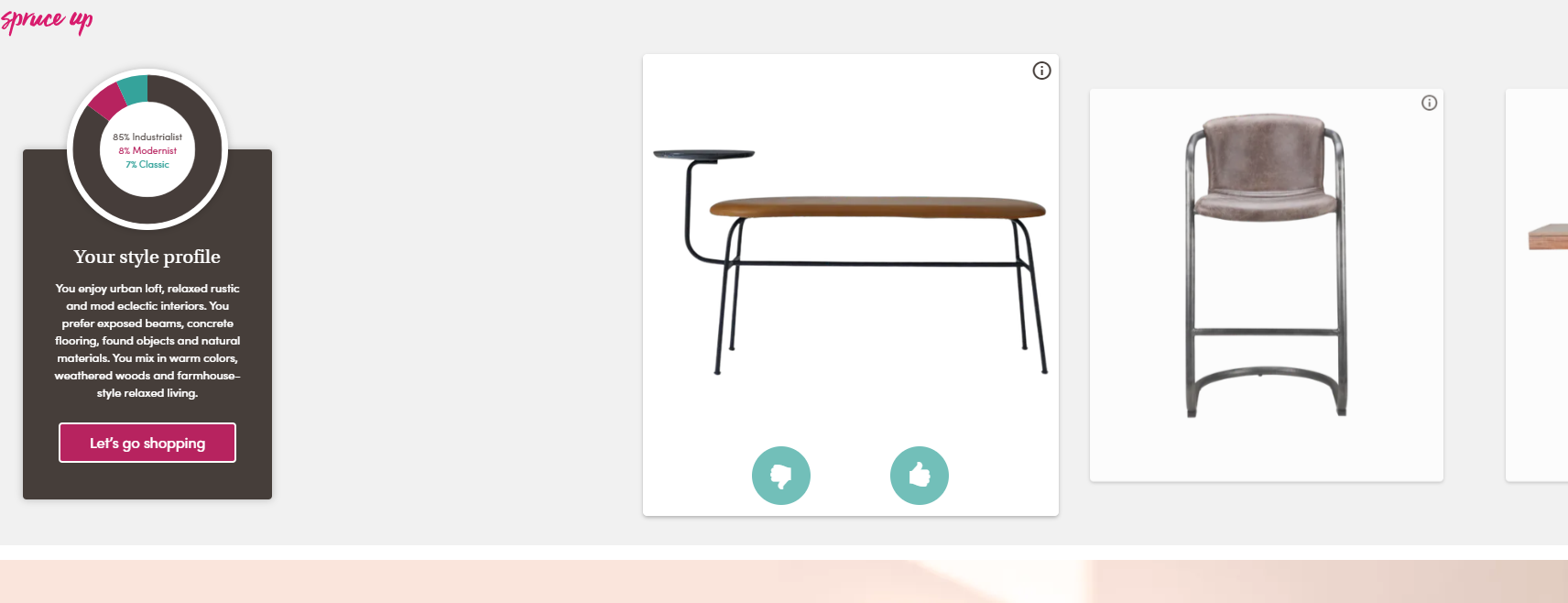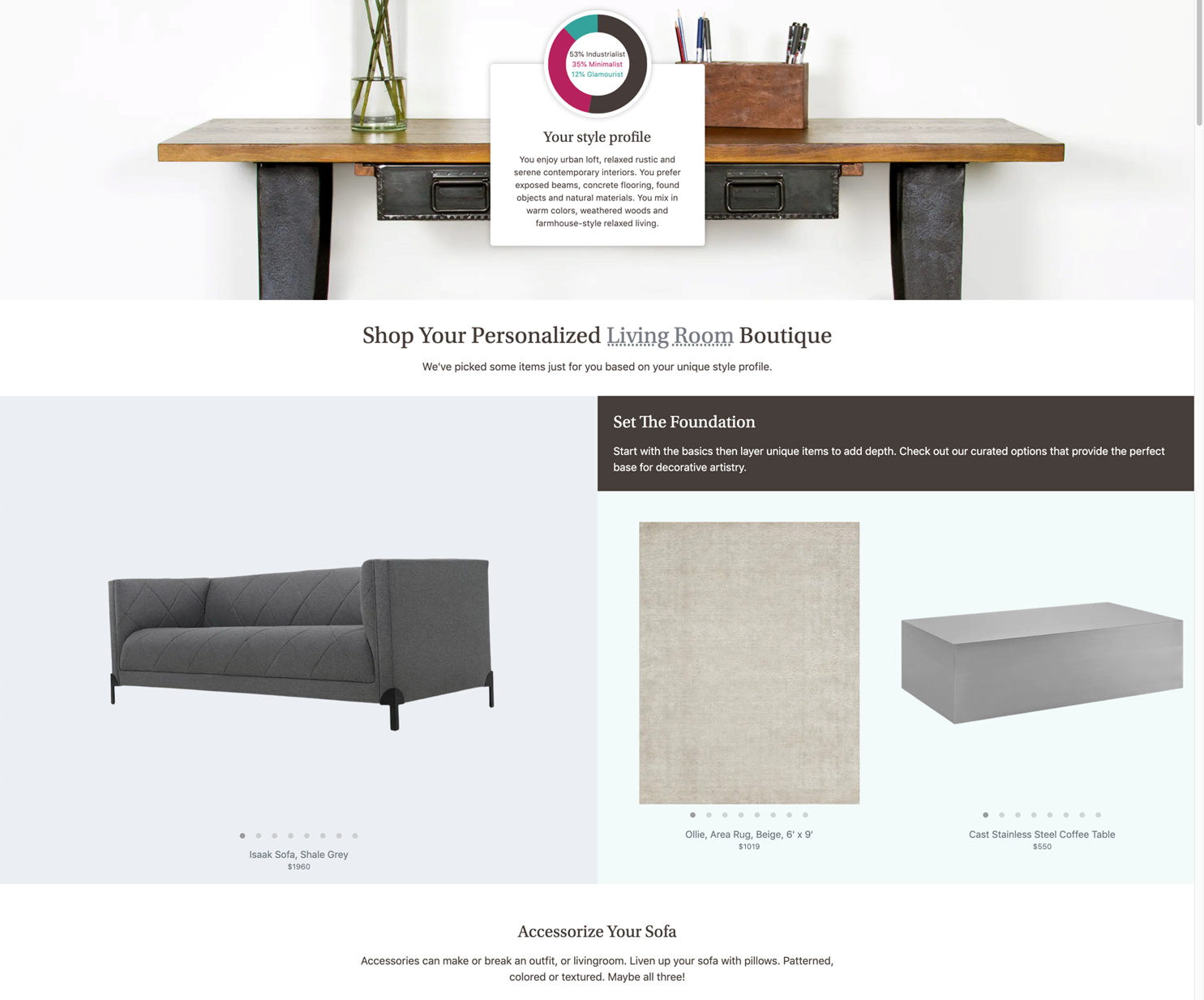Watch all the Transform 2020 sessions on-demand here.
Home decor startup Spruce Up has launched an updated ecommerce platform that leverages machine learning to recommend goods to homeowners.
Using what it touts as a proprietary “style genome” trained by professional designers, Spruce Up is looking to automate a process that would typically require some back-and-forth interactions between the customer and a human stylist.
By way of a quick recap, Spruce Up is a spinout of Madrona Venture Labs, a startup incubator launched by VC firm Madrona Venture Group back in 2014. To date, Spruce Up has raised $4.5 million in funding from investors that include Madrona, Two Sigma Ventures, Female Founders Fund, Alumni Ventures Group, and Peterson Ventures. The startup was officially founded out of Seattle in 2017 and launched its first beta proof-of-concept platform last October.
In its original guise, Spruce Up was a stylist-curated shopping service — a “human-in-the-middle” AI model, as the company puts it, with interior designers curating an evolving mini boutique for $25. It was a little like what Stitchfix has been doing in the fashion realm, combining algorithms with human curation. Fast-forward to November 2019, and Spruce Up is largely removing the human element and going for a fully AI-powered approach, though customers can request its more manual styling service if they prefer.
June 5th: The AI Audit in NYC
Join us next week in NYC to engage with top executive leaders, delving into strategies for auditing AI models to ensure fairness, optimal performance, and ethical compliance across diverse organizations. Secure your attendance for this exclusive invite-only event.
“Our AI is trained by our expert designers, applying the knowledge of how interior designers recommend products and create sets to pull a look completely together,” Spruce Up cofounder and CEO Mia Lewin told VentureBeat. “We started developing our AI over a year ago based on our early beta site.”
Style quiz
As before, Spruce Up runs through a “thumbs up, thumbs down” quiz spanning myriad products, colors, and designs to arrive at a “style profile.” The user can continue to fine-tune the recommendations through the “style tuner” to further personalize recommendations.

Above: Spruce Up: Personalized quiz
In this example, the user apparently enjoys “urban loft, relaxed rustic, and mood eclectic interiors” and “exposed beams and concrete flooring.”
It’s also worth noting that the recommended goods are mostly luxury items. Spruce Up takes a cut of sales from the retailer, though all the sales are completed entirely on the Spruce Up platform.

Above: Spruce Up: Luxury goods
On the surface, it’s not entirely clear where the data-crunching or “machine learning” is taking place, but Spruce Up said the quiz is designed around its own data science and proprietary taxonomy and incorporates 60 high-signal data points, covering style, colors, materials, and design aesthetics. Additionally, responses to the quiz are matched to its “style genome” — a designer taxonomy that spans more than 1.7 trillion possible product combinations in its catalog.
“Pandora for home shopping”
Similar to recommendation systems that exist in other online services, such as music streaming — perhaps best evidenced by Pandora’s music genome project, or more recently Spotify’s tailored playlist efforts — a continuous feedback loop improves Spruce Up’s machine learning-powered recommendations not only for the individual, but for other customers who share similar taste.
“Spruce Up is doing for home shopping what Pandora did for music and Netflix did for movies,” said Lewin.
If one customer ends up making several purchases based on Spruce Up’s recommendations, for instance, the platform may suggest some of those same products to people with a similar style profile.
“We’ve focused on building the training data that powers our style genome through our catalog annotation, stylist recommendations with customer feedback mechanism, and our style tuner that launched this summer,” Lewin added. “In preparation for the launch of our new personalized shopping platform, we’ve built a corpus of data spanning over 100 million proprietary style aesthetic data points.”
The global home decor market was pegged at $663 billion in 2018, a figure that bodes well for the slew of tech-focused interior design startups that have come to the fore in recent times. Modsy, for example, lets users create 3D renderings of their home so they can visualize it with various kinds of furniture, and the San Francisco-based startup recently raised another $37 million in funding. Then there is virtual interior design platform Havenly, which closed a fresh $32 million funding round just a few weeks back.
Automation is infiltrating just about every industry, and it seems from recent investment activity — and the fact that Spruce Up is now doubling down on its automated home-styling efforts — that interior design is ripe for disruption.


